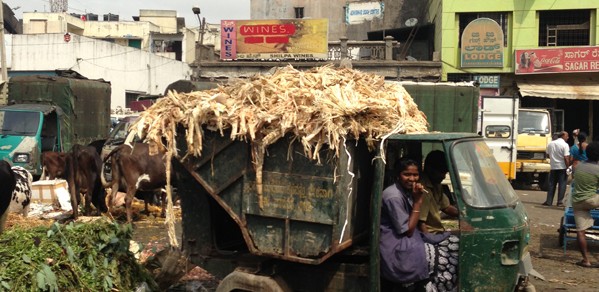
Luca Di Mario is a Gates Scholar studying for his PhD at the Department of Engineering's Centre for Sustainable Development. In this article he explains why businesses should get involved in waste recovery in the developing world.
As cities grow rapidly, urban municipalities in developing countries struggle to provide adequate sanitation services to cope with the increasing waste generation.
Luca Di Mario
If there is a record I can claim, it is surely not that I have published in the best scientific journals or developed a ground-breaking technology but, perhaps, that my research focuses on one of the dirtiest topics of our society. Bluntly put, I investigate crap (yes, human and organic solid waste – intrinsically nasty, dirty and smelly).
As cities grow rapidly, urban municipalities in developing countries struggle to provide adequate sanitation services to cope with the increasing waste generation. Expressed in numbers, roughly 21% of the global urban population lack access to “improved” sanitation facilities, and 30% to 50% of waste generated in cities remains uncollected. Furthermore, where waste (solid waste, wastewater and latrine residues) is collected, most of it is discharged untreated into the environment. This results in health and environmental hazards for urban communities, particularly in peri-urban and poor areas (e.g. slums) where there are fewer sanitation services. Moreover, from a resource standpoint, this is a huge waste of water, nutrients and energy, all of which are contained in and thrown out with solid organic and human waste.
Resource, Recovery and Reuse (RRR) from waste makes sense and can help in addressing the challenge described above. In fact, RRR decreases environmental pollution, can make available cheap resources to local communities and can help to recover costs associated with operation and maintenance of sanitation systems. However, to achieve true sustainability over the long term, a shift towards a business-oriented approach (in the form of private enterprise or public-private partnership) is required.
I have witnessed this shift in studying more than twenty successful and sustainable enterprises during my fieldwork across Latin America, Asia and Africa. From composting plants that produce fertilisers (from waste and latrine residues) to pit-emptying truck drivers that sell loads to farmers, RRR businesses create jobs that are demonstrated to be safe, and they make more resources available to local communities.
The challenge now is to test if and how these businesses can be scaled up and what additional benefits or risks they may generate once at scale. This is the focus of my research, which is carried out with an interdisciplinary team of researchers from the International Water Management Institute (IWMI) and the Water and Sanitation in Developing Countries Department (SANDEC) of the Swiss Institute for Aquatic Research.
Luca Di Mario specialises in the field of sanitation and water management, where he has worked for two years on international development projects across Asia, Africa and Latin America.He joined the Department of Engineering in 2009 as a MPhil student in Engineering for Sustainable Development. After his MPhil, he worked as consultant for the United Nations International Fund for Agricultural Development as Water Management specialist, working on small-scale irrigation and water development projects in India, Bangladesh and Ethiopia. He re-joined the Centre for Sustainable Development in 2012 as a PhD student. His research focuses on resource (i.e. nutrients, water and energy), recovery and reuse in agriculture for low-income countries and from the perspective of business models. The main aim of the research is to understand the environmental/health risks of RRR and necessary mitigation strategies. The research is part of a joint IWMI/World Health Organisation research project.
This article originally appeared in The Scholar magazine.

